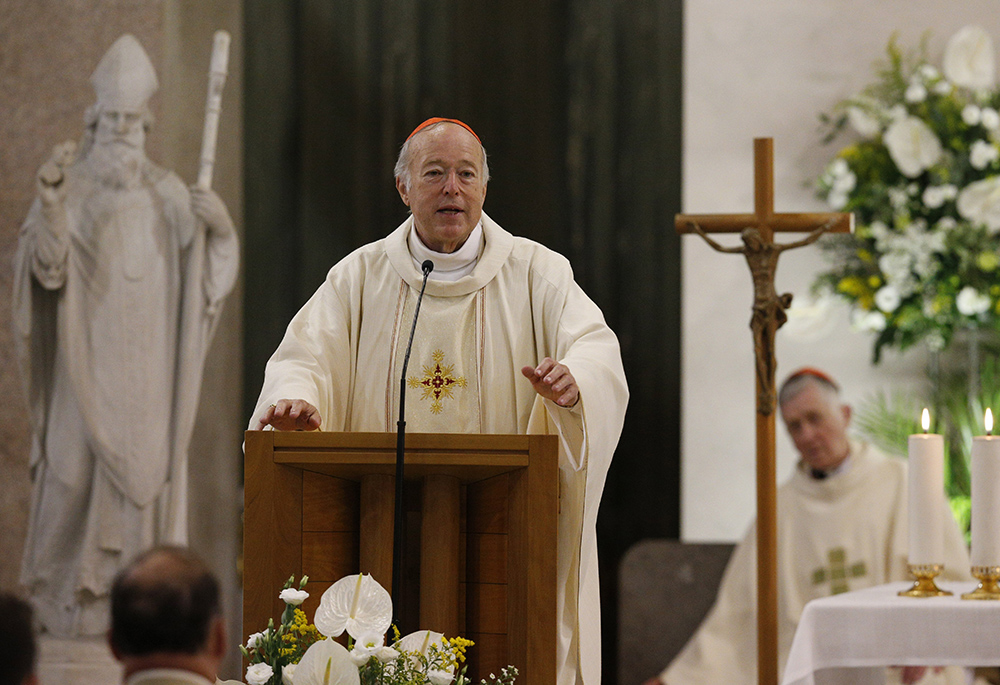
Cardinal Robert McElroy of San Diego gives the homily as he celebrates a Mass of thanksgiving at St. Patrick's Church in Rome in this Aug. 28, 2022, file photo. (CNS/Paul Haring)
San Diego Cardinal Robert McElroy sharply criticized the Eternal Word Television Network, the conservative Catholic U.S. media conglomerate, in an interview with Spanish magazine Vida Nueva published on March 24.
Vida Nueva asked McElroy about the decision of newly installed Bishop Fernando Prado of San Sebastián, Spain, to ban diocesan television from carrying content produced by EWTN. Prado wrote that he made the decision "trying to support the communion of the diocese with the Successor of Peter."
"I would not have EWTN on diocesan media either," McElroy responded.
"EWTN worries me because it represents a giant of economic and cultural power connected to a religious viewpoint that is fundamentally critical of the pope," the cardinal said.
"The main anchors of the channel constantly minimize the abilities and theological knowledge of Francis, cite Archbishop Carlo Maria Viganò's slander of the pope and try to move the world away from the reforms the pope is signaling," said McElroy.
Viganò, a former Vatican ambassador to the U.S., has called on Francis to resign the papacy.
McElroy said that Francis has encountered so much opposition because of his "intention of completing the work of the Second Vatican Council," as well as his "constant inclusion of the experiences and spiritual points of view of the Global South at the center of the life of the church."
In the U.S., McElroy said that this opposition is exacerbated by Catholics' worries that "the pope is open to exploring paths of pastoral action in the church that are not prohibited by existing doctrinal formulations."
"Francis' attention is centered on the life of the believer in its complexity and on how the Gospel and the tradition of the church can apply in an effective and compassionate way to the lives of those who struggle ardently to draw close to God and follow his path in the midst of so many challenges," said McElroy.
This focus of Francis "doesn't have the clarity and security that many have come to trust in their understanding of the faith," said McElroy. "But it does incarnate the pastoral method of the same Lord who calls us to draw close to each person first with a loving embrace, then with help and healing, and after with the call to conversion and to change."
Advertisement
In the interview, McElroy reiterated his previous call to open the diaconate to women, while raising concerns about the ordination of women to the priesthood.
"I am afraid that the ordination of women to the priesthood in this moment would deeply divide the church and for this reason it should not be an objective of the synodal process," McElroy said, taking a more definitive stance on the issue than in his article for America magazine, where he wrote that it was "likely" the synod would opt to reserve the priesthood for men without stating a personal position.
When asked if Francis can be considered a feminist, McElroy responded that it would be "jarring" to classify the pope that way. But the cardinal praised the pope for better including women in church structures.
Francis "has broken significant barriers for women in the life of the church and has constantly underscored the essential role that women carry out in Catholic faith and action at all levels," McElroy said.
However, McElroy said, "he is still looking for — as is the whole church — a theological framework that soundly reveals the equality of women in its fullness, in the midst of the unequal cultures of our Catholic world."
McElroy's recent writing about how the church should minister to LGBTQ people and divorced and remarried Catholics has received significant backlash, including an essay where Bishop Thomas Paprocki of Springfield, Illinois, seemed to accuse McElroy of heresy.
When asked by Vida Nueva if the accusation of heresy hurt him, McElroy acknowledged that it did, but he said it hurt the church more.
"This language endangers the church even more, in breaking down the dialogue that we should maintain these days about the fundamental questions that we are confronting," McElroy said.
He noted that he had written his doctoral thesis in theology on Jesuit Fr. John Courtney Murray. Murray, who served as the chief author of the Second Vatican Council document Dignitatis Humanae, the Declaration on Religious Freedom, had been earlier forbidden to write about religious liberty without approval from the Jesuit superior general.
"It is vital that during all of these debates over doctrinal questions we resist the temptation of using negative labels against those who adopt postures that are opposite to ours," said McElroy.








